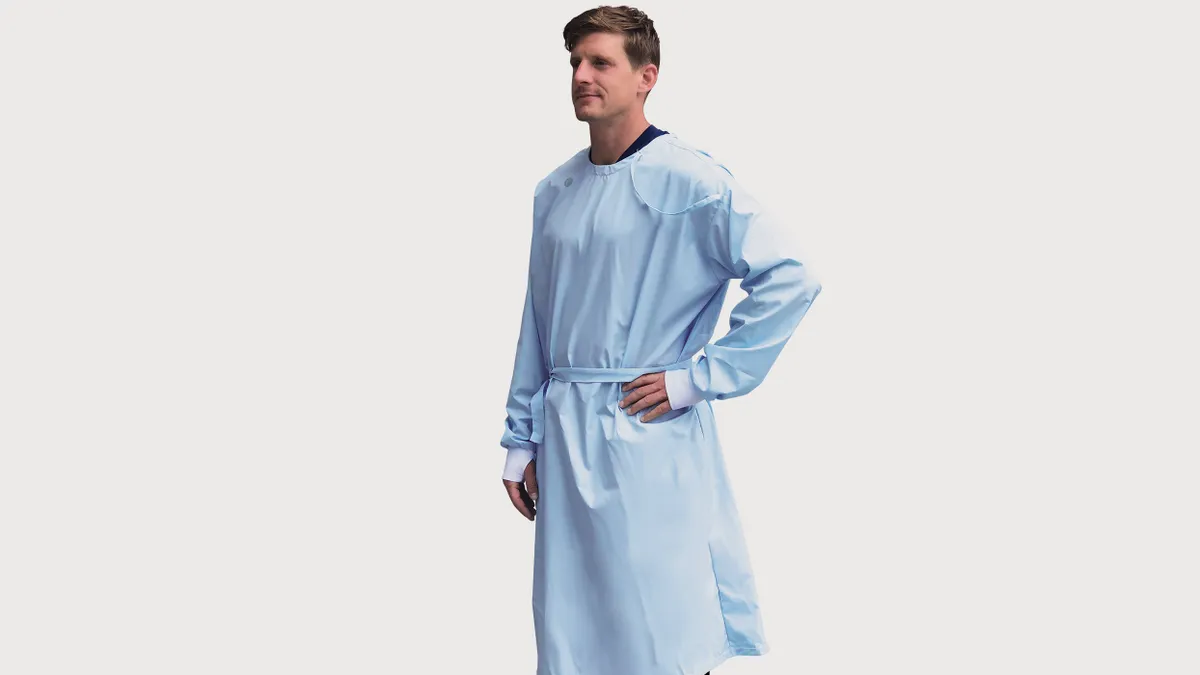It started with a marketing email sent to avid rowers in the spring of 2020.
JL Racing, the apparel brand well-known among rowing aficionados, was asking for industry contacts in the healthcare field.
The family-owned company was attempting to make a major pivot into manufacturing reusable medical gowns for healthcare workers on the front lines of the COVID-19 pandemic.
The pause on sports pushed the legacy sports apparel manufacturer to accelerate plans on a new product it had been working on for the past few years — a reusable medical gown.
Leaders at Northern Virginia's Inova health system — like so many across the country — were struggling to find a reliable source of personal protective equipment for their workers.
"There was a huge PPE shortage and the kinds of gowns that we were getting in to fill in for our normal gowns were pretty abysmal," Michelle Peninger, assistant vice president of infection prevention at Inova, told Healthcare Dive.
The sizing was inconsistent among the replacement gowns; some were too narrow, sleeve lengths varied, exposing forearms, and belts that were too long would become contaminated after dragging on the floor.
This was occurring at the peak time when “people wanted protection,” Lucy He, director of infection prevention and Control at Inova, told Healthcare Dive.
Inova physician Rick Place happened to read the marketing email from JL Racing. At the time, Place served on a committee tasked with figuring out creative solutions to address the PPE shortage at Inova.
"I remember getting that first phone call with such trepidation," Jonathan Maloney, chief operating officer of La Forma, said of the initial call with Inova leaders. La Forma is the brand the group behind JL Racing created for the gowns.
Early in 2020, frauds and scammers were trying to take advantage of the broken supply chain amid the immense need for protective gear for America's hospitals. Maloney wondered how to convince the health system his firm was legitimate without sounding too good to be true.
After the initial conversations, Inova leaders and La Forma decided to work together to create a reusable gown that fits better, is easier to take on and off, and can be reused up to 100 times.
The two organizations worked closely, soliciting feedback from nurses and staff to improve the gown, sometimes meeting over late-night Zoom calls. What they came up with is a gown that no longer rides up on the forearm now that it has thumbholes, and an easier way to remove the gown thanks to a ripcord-like feature that eliminates having to ask for help to reach a tie at the back of the neck.
"The thing that people love most about this is there's a pull cord on the left shoulder," He said. "The feedback that we've gotten from a lot of frontline workers is, 'we're in the room for hours and it's not as hot as all the other gowns. It's really breathable and it feels cool.'"
The product is now in use at two of Inova's five hospitals after the first gowns were rolled out at Inova’s flagship hospital in February 2021. Inova's infection control leaders will present at an annual industry conference this week, informing their peers in infection prevention about their work with La Forma.
The switch to reusables has not come without issues.
There needs to be a thought out system in place in order to use reusable gowns; from storage to laundering and where to place on a unit for the fastest access. That all took time to iron out, He said.
The health system did not share financial figures, but said they have prevented 213 tons of waste from ending up in a landfill. They typically used 3.1 million single-use disposable gowns each year.














